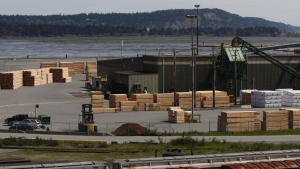Western Forest Products, one of the largest lumber producers in British Columbia, has announced a temporary curtailment of production at its sawmills in the province. This decision comes as a result of ongoing challenges in the forestry industry, including a shortage of logs and high operating costs.
The curtailment will affect four of Western Forest Products’ sawmills, located in Ladysmith, Chemainus, Saltair, and Duke Point. Production at these mills will be reduced by approximately 15% for the remainder of the year. The company has stated that this measure is necessary in order to align production with current log supply and market demand.
In a statement, Western Forest Products CEO Don Demens acknowledged the impact of this decision on employees and their families, but emphasized the importance of maintaining a sustainable business model. He also expressed hope that the curtailment will be temporary and that production levels will return to normal in the future.
This announcement comes at a time when the forestry industry in British Columbia is facing numerous challenges. The province’s mountain pine beetle infestation has significantly reduced the availability of timber, while the ongoing softwood lumber dispute with the United States has resulted in high tariffs on Canadian lumber exports. In addition, the COVID-19 pandemic has caused disruptions in supply chains and increased operating costs for many companies in the industry.
The curtailment at Western Forest Products’ sawmills is just the latest in a series of production cuts and closures in the forestry sector in British Columbia. In recent years, numerous mills have been forced to shut down due to a combination of factors, including the decline in timber supply and the impact of the softwood lumber dispute.
Despite these challenges, the forestry industry remains a vital part of British Columbia’s economy, providing thousands of jobs and contributing billions of dollars to the province’s GDP. The temporary curtailment at Western Forest Products’ sawmills is a reminder of the ongoing struggles faced by this important sector, and the need for sustainable solutions to ensure its long-term viability.
In conclusion, Western Forest Products’ decision to temporarily curtail production at its B.C. sawmills highlights the ongoing challenges in the forestry industry and the need for sustainable solutions. While this measure may have a significant impact on employees and their families, it is a necessary step to align production with current market conditions. The company remains hopeful that this curtailment will be temporary and that production levels will return to normal in the future.




